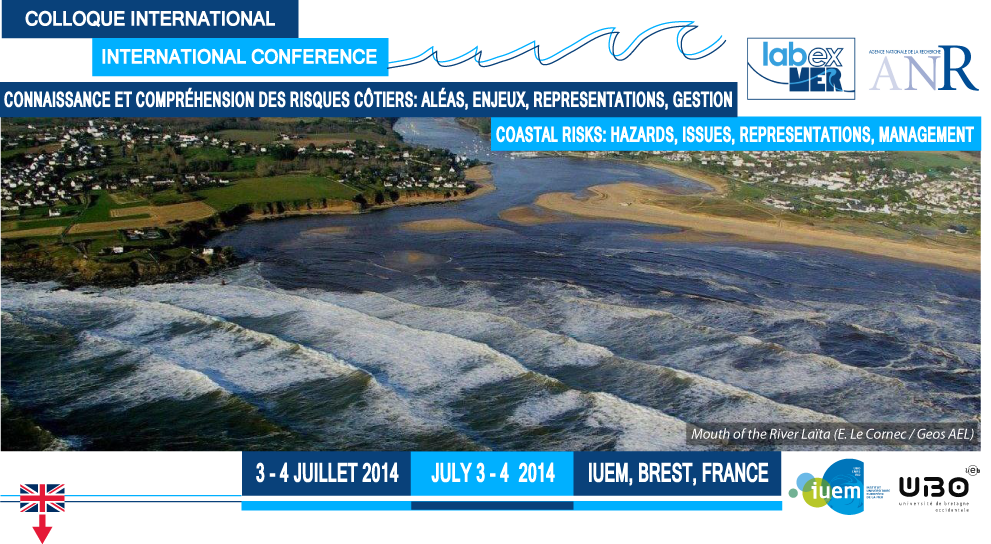
Invited speakersSix guest speakers, researchers from various disciplines, are invited to participate in the two plenary sessions, Thursday morning and Friday afternoon (presence of an interpreter to provide simultaneous translation).
Tomasz Boski Tomasz Boski is Professor of geosciences at University of Algarve and Scientific Coordinator of the Center for Marine and Environmental Research. He obtained a Ph.D. in geology at the Free University of Brussels in 1987, and an aggregation in Marine and Environmental Science from the University of Algarve (2003). He held the positions of Geologist for Contitec S.A. (Brazil), Research Assistant at the Institute of Building Materials in Warsaw, director of the analytical laboratory in the Ministry of Natural Resources of Guinea Bissau, post-doc researcher and associate professor at the Free University of Brussels, and assistant professor at the university of Tras-os-Montes and Alto Duro. Tomasz Boski’s researches focus now on climate and sea level change during the late quaternary, on geochemistry of sedimentary processes, and on an integrated science-based territorial / coastal management. Coastal zone of Iberian Peninsula and Brazilian shoreline are some of his main study areas.
Omer Chouinard Omer Chouinard obtained a Bachelor’s degree of Social Sciences from the University of Moncton in 1968, a Master’s degree of the University of Laval in 1975 and a PhD of the University of Quebec at Montreal (UQAM) in 1992. He is attached to the Department of Sociology and to the Master of Environmental Studies program of the University of Moncton, which he directed from 1999 to 2007. He has been working for nearly 40 years to study different topics like sustainable development, communities’ involvement, natural resources management, environmental awareness and education, communities’ empowerment for the preservation of their environment. O. Chouinard is currently involved in national and international research projects interested in fisheries catches in Canada (CRSNG, 2010-2015),Coastal communities’ challenges in the context of global climate changes (CRSH, 2010-2015), Adaptation Research, a Trans-disciplinary transnational community and policycentered approach, ARTISTICC (Forum Belmont, 2013-1016). - Robert D'Ercole Robert D’Ercole is director of research at the IRD (Institut de Recherche pour le Développement) since 2005. He is also a member of UMR PRODIG. He started his career as associate professor of geography before working at the University of Antilles and French Guyana (Martinique) then at the University of Savoie (Chambery). He led his first researches on risk in 1984, but the eruption of the volcano "Nevado del Ruiz" in Colombia on 13 November 1985 is a significant event in his life as it enlightened the major role of the little known (at this time) concept of vulnerability. Since then, R. D’Ercole has focused his scientific work on this research topic. He has studied different kinds of vulnerability issues in several regions of the world, especially in the Andean countries and in the Caribbean region. He has been in charge of several research programs like PACIVUR from IRD, which he created and directed from 2006 to 2011 (Andean research and training program on vulnerability and risks in urban areas, focused on Ecuador, Peru and Bolivia). His last project led him to work in Port-au-Prince (Haiti) in 2012 – 2013. - Job Dronkers Job Dronkers studied at University of Strasbourg and obtained a PhD in physics from the CEA (France's Atomic Energy Commission) in 1975. He began his career by studying the environmental impact of the storm surge barrier from Escaut (Delta Plan, Netherlands). In Netherlands, he has been involved in the development of a coastal management policy based on the principle of “working with nature”. He directed the Department of Marine and Coastal Studies at the Ministry of Infrastructure and the Environment. He has also been professor in Coastal Systems Physics at the University of Utrecht. Since his retirement in 2012, he regularly undertakes missions to advise African countries on coastal management. - Helene Joffe Helene Joffe is Professor of Psychology at UCL (University College London - Division of Psychology and Language Sciences). She is a social and health psychologist. Her work has focused on social representations of a range of risks, starting with emerging infectious diseases such as AIDS and then, more recently, earthquake and climate change related risks. Her interest is in how publics engage with such risks with special attention paid to the emotive and cultural factors that forge their responses. Their representations have consequences for preparatory behaviour, such as how they prepare for earthquakes. Helene Joffe’s most recent edited book is ‘Cities at Risk: Living with Perils in the Twenty First Century’ (Springer, 2013) and she has published a vast range of peer reviewed papers and chapters within the risk area. - Christophe Viavattene Christophe Viavattene is a Senior Research Fellow at the Flood Hazard Research Centre – Middlesex University London. Christophe’s research is mainly focussed on water resources and flood risk management through an interdisciplinary perspective. He has joined the Research Centre in 2007 and since then has participated in many EU projects. In 2010-2012 he has contributed to the EU CONHAZ project (Cost of Natural Hazards), working specifically on the costs of floods. Christophe is also strongly involved in developing the methodologies for assessing the benefits of Flood and Coastal Risk Management in England and Wales and was involved in the latest edition of the Multi-Coloured Manual and its new website (www.mcm-online.co.uk). Christophe is currently involved in a new EU FP7 project RISC-KIT (Resilience-Increasing Strategies for Coasts – toolkit) and is leading the work package on coastal risk assessment framework for regional scale.
|

